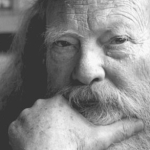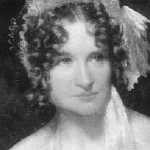I sing of Morrisville
(if you call this cry
a song). I
(if you call this painful
voice by that great name)
sing the poverty of my
region and of
the wrong end of Morrisville.
You summer people will say
that all its ends are wrong,
but there, right there,
the very end of the wrong end—
a house with windows sagging,
leaning roadward as in defense
or maybe defiance
next to the granite ledge,
our cliff of broken stone
that shoulders our dilapidated
one-lane iron bridge.
Who lives here? I don’t know.
But they (Hermes reward them)
made this extraordinary garden,
geraniums,
petunias and nasturtiums
planted in every crevice and all
the footholds of the cliff.
And then
they painted the cliff-face,
painted the old stone; no design,
just swatches of color, bold
rough splashes
irregularly, garish orange
and livid blue. Is it
fluorescent, do these stones
glow in the dark?
Maybe. I only know
they glow in the day, so
vivid I stopped my car,
whereupon two others
came inquiring also, two
crows in the broken spars
of the white pine tree, cawing
above the house.
Why had those who inhabited
this corner of poverty
painted the stones? Was it
that the flowers
in living bravery nevertheless
made too meager a show
for the ruined cliff? Or did they
think to bring art
to nature, somehow to improve
this corner of ugliness?
For my part I thought how
these colors
were beautiful and yet strange
in their beauty, ugly colors,
garish orange, livid blue;
they reminded me
of those Spanish cemeteries
I saw in New Mexico, tin
mirrors and plastic flowers
in the desert. Then
I knew why the stones
had been painted: to make
reparation, such as the poor
might make, whose sorrow
had been done here, this
desecration. Is not this
the burden of all poor lands
everywhere,
the basis of poverty?
A spoiled land makes spoiled
people. The poor know this.
I guess
the crows know too, because off
they flew, cawing above
the bridge and the slashed hills
surrounding Morrisville.
I started my car and drove
out on the iron bridge
which rumbled its sullen
affirmation.
And I sang as I sing now
(if you care to call it song)
my people of Morrisville
who live
where all the ends are wrong.




















Comment form: